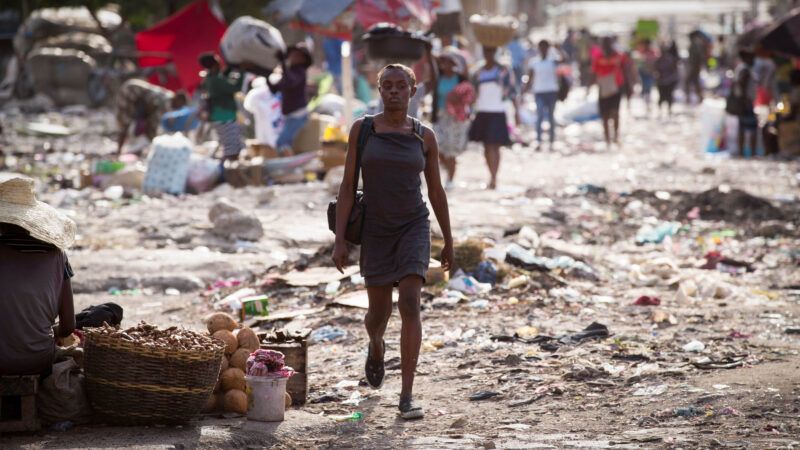Don't Ask U.S. Troops To Solve Haiti's Problems
It’s unclear what a military intervention could even accomplish.

The recent assassination of Haitian President Jovenel Moïse in his Port-au-Prince home has plunged the nation, the poorest in the Western Hemisphere, into another phase of violence and instability. The Haitian government, not particularly effective on a normal day, is begging for international assistance to keep the country in some degree of calm and order during a tenuous transitional period. Interim President Claude Joseph has gone so far as to request a provisional U.S. military deployment to guard Haiti's key infrastructure, a proposal the Haitian people don't support.
Outside of buttressing a U.S. Marine detail to protect the U.S. Embassy, the Biden administration is wary, if not outright opposed, to Haiti's request for a U.S. troop deployment. While the prospect of thousands of Haitians fleeing to the United States can't be ruled out if the situation further deteriorates, President Joe Biden is right to reject the Haitian government's request. The last thing Washington needs is yet another ill-advised, reactive military intervention in a de facto failed state—particularly at a time when the White House appears intent on extricating U.S. forces from wars that have cost too much, have gone on for too long, and have had next to no return.
Even before Moïse's late-night assassination, Haiti was in the midst of extreme political and economic turmoil. The nation of 12 million people has been without a functioning parliament for a year and a half. Due to the absence of a legislature, the entire government has operated by decree. Approximately 30 gangs control a large area of Port-au-Prince; thousands of Haitians have fled their neighborhoods from intergang violence. René Sylvestre, the head of Haiti's Supreme Court, passed away from COVID-19, a virus that is ravaging the broader population.
Moïse's killing has taken this dire situation and turned it into a catastrophe. Today, there are three separate Haitian politicians claiming to be Moïse's successor, a political contest for power bearing the markings of a serious confrontation. One of Haiti's powerful gang bosses is readying his own troops for action, claiming the assassination was a large foreign-orchestrated conspiracy against the Haitian population. The police, corrupt and riven by schisms, aren't exactly in a position to quell any violence that may erupt.
The U.S. military, however, isn't in a position to do so either. In fact, it's questionable whether foreign troops in any capacity would have the resources, patience, and fortitude to save Haitians from the depravity of their own politicians. There was a time not so long ago when United Nations peacekeepers were authorized to return democracy to the island during yet another fractious period in its history—the forced exile of President Jean-Bertrand Aristide. That U.N.-authorized peacekeeping mission would last for more than 15 years, and the result was anything but the peace, democracy, and stability Washington and its partners on the Security Council hoped to accomplish. Instead, Haiti's problems arguably multiplied. The mission was not only implicated in human rights abuses, but brought a deadly cholera epidemic to the country which killed upward of 10,000 people.
The U.S. military has some experience in Haiti as well. In 1994, 25,000 U.S. troops were sent to the island in a mission code-named Operation Uphold Democracy, a deployment designed to restore the democratically elected government to power after being ousted in a military coup three years earlier. While the mission succeeded in ridding the military junta from the capital and negotiating the exile of the coup's architect (Lt. Gen. Raoul Cédras), one can hardly call it a long-term success given Haiti's current circumstances.
The bottom line is clear: While the U.S. military is still very much the best fighting force on the planet, it hasn't proven to be especially competent in building democracies from the ground up in other countries. However, this shouldn't be a surprise. The U.S. military is not organized to play the role of a global force of do-gooders dispatched to the world's trouble spots, holding the line until the local authorities find a way to work through their internal conflicts—or worse, until the U.S. military itself comes up with a solution. To task U.S. troops with political missions is to saddle them with responsibilities they can't reasonably be expected to meet, all the while providing the host government with the cover to continue business as usual. Whether in Afghanistan, Iraq, or Haiti, deployments like these create more problems than they solve, shift the ultimate responsibility for fixing them onto the backs of U.S. soldiers, and can easily expand from months to years.
To its credit, the Biden administration appears unenthused with the idea of turning U.S. forces into security guards for Haiti's infrastructure. The most the White House is likely to give the Haitian government is support for the Moïse murder investigation. U.S. officials from the Department of Justice and Homeland Security are already in Port-au-Prince assisting the Haitian National Police. To the extent U.S. federal law enforcement has something to offer in this investigation, Washington should lend its expertise.
Anything more, though, would be a dangerous slide into another long-term U.S. overseas deployment with marginal benefits. Let Haiti serve as a lesson for Washington writ large: the U.S. military is designed to defend the United States of America, not right every wrong in the world.


Show Comments (44)